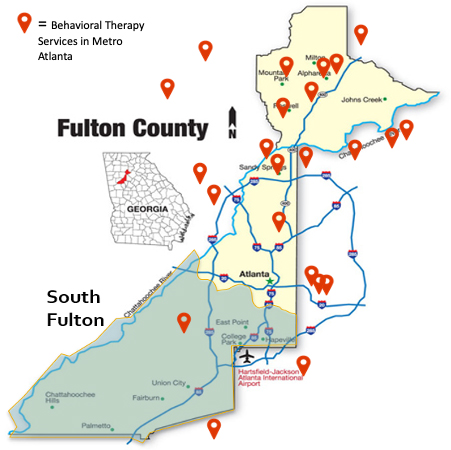The purpose of this DILAC grant is to develop a digital-visual map of autism services in metropolitan Atlanta, GA that can be used to document and expose autism service disparities for research and educational purposes and a practical tool that care coordinators can use as they navigate services for underserved families.
The project consisted of three phases.
Phase 1: Stakeholder participation. We conducted and analyzed focus group data collected from care coordinators, social workers and providers of autism services in Georgia. The focus group helped us identify the most useful information needed for care coordinators and priorities of services that should be mapped out in a digital-visual format. This phase also identified data sources to include in the platform. A second focus group was conducted with autistic adults and providers who work with autistic adults in order learn more about the autism services cliff that occurs when people transition to adulthood, as well as data that supports this phenomenon.
Phase 2: Build prototype. In Spring 2021, we built a prototype of the Autism Service Map in Georgia utilizing services from the Parent to Parent of Georgia Special Needs Database. The Map also has the ability to highlight social and economic factors by county based on the Center for Disease Control and Prevention Social Vulnerability Index data. We demonstrated the Map to stakeholder groups to get their feedback since one major outcomes of this project is to develop a digital-visual platform that can easily add new data, be adapted by others to suit their own needs, and create outputs that can be printed for immediate use. Our initial prototype has achieved these goals. We also built a
data visualization of the adult autism services cliff using the data generated for the autism services map, as well as other national data sources that relate to adult autism services and prevalence.
Phase 3: Education and Sustainability. The autism services map will be integrated into Professor Singh’s course: Sociology of Medicine and Health, which will include a new teaching module that introduces the students to the Autism Services Map and an assignment using the map that builds their knowledge of fundamental causes of health. The students will also be involved in keeping the data used to generate the digital-visual maps up to date and will have the opportunity to build different datasets to be included in the digital platform based not only on location of autism services and providers but also social and structural factors that affect access to and location of these services, such as income level, racial composition, transportation lines, and other population characteristics that can be mapped onto the digital platform. Thus, this project has sustainability and growth potential as a tool for student learning and practical application for care coordination in autism services.
Three graduate students were involved in this project. Two of which were employed by the DILAC grant and one who work on the project through an HTS special projects class.
Elise Zheng, PhD student in History and Sociology of Science and Technology in the School of History and Sociology worked on the project during the entire funded project. In Fall 2020, Elise helped to conduct a focus group and identify data sources to be used for the autism services map. She also created some initial maps using Tableau with data that we collected from the Centers for Medicaid and Medicare Services that listed the different providers in the state of Georgia who offer autism specific services. To better understand the Medicaid data, Elise also did a literature review of how Medicaid data has been used to investigate autism services research and disparities. I utilized my own research money to fund Elise for a few hours a week in Spring 2021 to help collect the data we used to build the autism services map and other data sources that will be added to the visualization.
Freyja Brandel-Tanis is a double master’s student in City and Regional Planning and Civil Engineering. In Spring 2021, Freyja was funded through the DILAC project to build the autism services map and a website host for the map using R and other computer languages. She created the mapping tool using data that we accessed through Parent to Parent of Georgia Special Needs Database. She also overlayed onto the map with different dimensions of the social vulnerability index published by the CDC.
Shrishti is a master’s student in Computer Science. She wanted to be involved with the project and took a special problems course to create a data visualization of the adult autism services cliff.

"Well, I can say the area I live…[and] the locations of some of the places that offer the services are…not in my local area, so I have to drive a great distance to get the services. So that’s the biggest challenge. It’s nothing in my area within a twenty-mile radius, so I have to drive to get there."
"There are not many doctors, medical professionals that take the Medicaid."
- Cynthia – Single African American mother of three children diagnosed with autism who lives in South Fulton County and relies on Medicaid Health Insurance
I will be demonstrating the Autism Services Map and Adult Autism Services Cliff at a virtual lunch breakout session during the Autism Conference and Expo being sponsored by the Center for Leadership in Disability at Georgia State in May 2021.
I plan to apply to a grant to support further development and testing of the Autism Services Map. I am meeting with various people on campus to identify possible funding opportunities and will be applying to the Pediatric Technology Center Research Endowment (and other opportunities as they arise): https://ptc.gatech.edu/pediatric-technology-center-research-endowment
This summer, I also plan to create a teaching module that will utilize the autism services map, including learning objectives, course readings, a specific assignment, and assessment. I will integrate this module into my Fall 2021 course: HTS 3086- Sociology of Medicine and Health.
